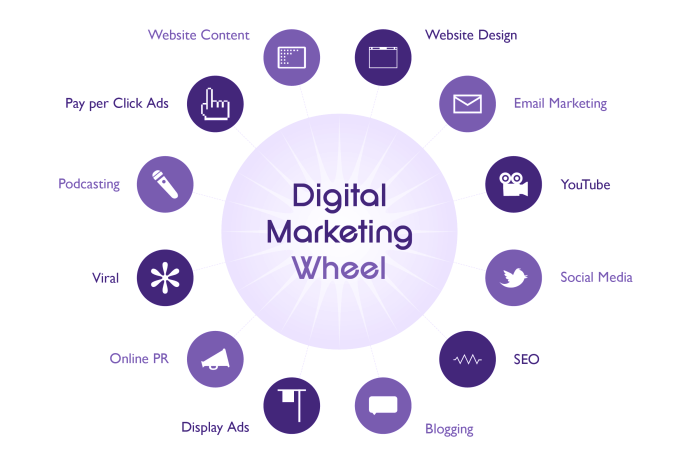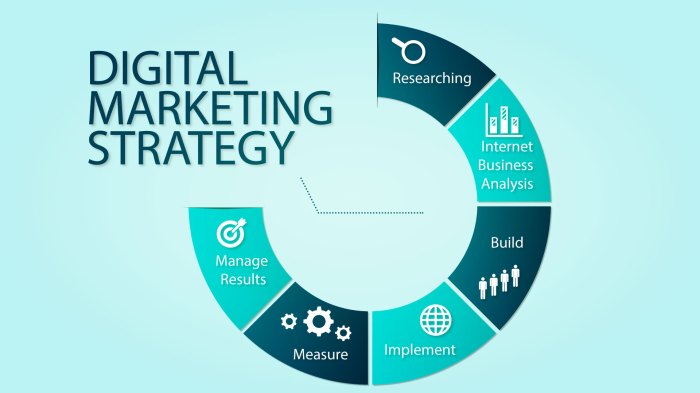Digital Marketing Strategy sets the stage for maximizing online presence and reaching target audiences effectively. Dive into the world of strategic marketing with a twist of modern flair.
From defining the strategy to implementing and optimizing it, this guide will take you on a journey through the essential components of a successful digital marketing plan.
Overview of Digital Marketing Strategy
Digital marketing strategy is a plan of action designed to achieve specific marketing goals through online channels. This strategy Artikels how a company will use digital tools and platforms to reach its target audience, promote its products or services, and ultimately drive sales and revenue.
Having a well-defined digital marketing strategy is crucial for businesses in today’s digital landscape. It helps companies effectively target and engage with their audience, build brand awareness, generate leads, and ultimately convert those leads into customers. Without a clear strategy in place, businesses may struggle to stand out in a crowded online marketplace and may miss out on valuable opportunities to connect with potential customers.
Examples of Successful Digital Marketing Strategies
- Content Marketing: Companies like HubSpot and Salesforce have successfully used content marketing to attract and engage their audience with valuable, informative content. By creating blog posts, videos, and other resources that address their audience’s pain points and provide solutions, these companies have been able to build trust and credibility, ultimately driving conversions and sales.
- Social Media Marketing: Brands like Nike and Starbucks have leveraged social media platforms like Instagram, Facebook, and Twitter to connect with their audience, build a community around their brand, and drive engagement. Through compelling visuals, engaging captions, and interactive content, these companies have been able to create a strong online presence and connect with customers on a more personal level.
- Search Engine Optimization (): E-commerce giants like Amazon and eBay have mastered the art of to ensure their products rank high in search engine results pages. By optimizing their website content, product descriptions, and metadata, these companies have been able to drive organic traffic to their sites and increase sales.
Components of a Digital Marketing Strategy

In the world of digital marketing, there are several key components that come together to form a successful strategy. These components work in harmony to help businesses reach their target audience and achieve their marketing goals.
Target Audience Analysis, Digital Marketing Strategy
Target audience analysis plays a crucial role in shaping a digital marketing strategy. By understanding the demographics, behaviors, and preferences of your target audience, you can create content and campaigns that resonate with them. This analysis helps you tailor your messaging and choose the most effective channels to reach your audience.
Social Media
Social media is a powerful channel in digital marketing, allowing businesses to engage with their audience, build relationships, and promote their products or services. Platforms like Facebook, Instagram, Twitter, and LinkedIn offer unique opportunities to connect with customers and drive traffic to your website.
(Search Engine Optimization)
is essential for ensuring your website ranks high in search engine results pages. By optimizing your website with relevant s, quality content, and backlinks, you can improve your visibility online and attract organic traffic. helps you reach potential customers who are actively searching for products or services like yours.
Email Marketing
Email marketing remains a valuable component of a digital marketing strategy, allowing businesses to communicate directly with their audience. By sending personalized and targeted emails, businesses can nurture leads, promote new products, and drive conversions. Email marketing is a cost-effective way to stay connected with customers and build brand loyalty.
Content Marketing
Content marketing involves creating and distributing valuable, relevant, and consistent content to attract and retain a clearly defined audience. By producing high-quality content such as blogs, videos, infographics, and eBooks, businesses can establish themselves as industry experts and engage with their target audience. Content marketing helps drive traffic to your website, generate leads, and increase brand awareness.
Developing a Digital Marketing Strategy
When creating an effective digital marketing strategy, there are several key steps to consider to ensure success in reaching your target audience and achieving your business goals.
Steps in Creating an Effective Digital Marketing Strategy
- Define Your Target Audience: Identify who your ideal customers are and understand their needs, preferences, and online behavior.
- Set Clear Objectives: Establish specific, measurable, achievable, relevant, and time-bound (SMART) goals for your digital marketing efforts.
- Choose the Right Channels: Select the most appropriate digital platforms to engage with your target audience based on where they spend their time online.
- Create Compelling Content: Develop high-quality and relevant content that resonates with your audience and encourages interaction and engagement.
- Implement Effective Strategies: Optimize your website and content to improve search engine visibility and attract organic traffic.
- Utilize Paid Advertising: Consider using paid advertising on platforms like Google Ads or social media to increase visibility and reach a larger audience.
- Monitor and Measure Results: Regularly track key performance indicators (KPIs) to evaluate the success of your digital marketing campaigns and make data-driven decisions.
Setting Measurable Goals for a Digital Marketing Strategy
Setting measurable goals is crucial for determining the effectiveness of your digital marketing strategy and ensuring that you are on track to achieve your objectives.
- Quantify Your Objectives: Clearly define what you want to achieve and establish specific metrics to track your progress.
- Track Key Performance Indicators: Monitor important metrics such as website traffic, conversion rates, click-through rates, and social media engagement to measure success.
- Regularly Review and Adjust Goals: Continuously assess your performance against your goals and make necessary adjustments to optimize your digital marketing efforts.
Importance of Tracking and Analyzing Data for Refining a Digital Marketing Strategy
Tracking and analyzing data is essential for refining your digital marketing strategy and maximizing your return on investment (ROI).
- Identify Areas for Improvement: Analyze data to pinpoint strengths and weaknesses in your campaigns and identify opportunities for optimization.
- Make Informed Decisions: Use data insights to make informed decisions about where to allocate resources and how to adjust your strategy for better results.
- Enhance Campaign Performance: By tracking and analyzing data, you can continuously refine your digital marketing efforts to improve performance and achieve your goals.
Implementing a Digital Marketing Strategy

Implementing a digital marketing strategy involves executing the plan across various channels to reach the target audience effectively. By utilizing the right tools and technologies, businesses can optimize their digital marketing efforts and achieve better results. A key component of this process is conducting A/B testing to refine and improve the strategy based on real-time data and insights.
Tools and Technologies for Implementing a Digital Marketing Strategy
- Social Media Management Platforms: Tools like Hootsuite and Buffer help manage multiple social media accounts, schedule posts, and analyze engagement metrics.
- Email Marketing Software: Platforms such as Mailchimp and Constant Contact enable businesses to create and send targeted email campaigns, track open rates, and measure conversions.
- Tools: Tools like SEMrush and Moz assist in research, site audits, and monitoring search engine rankings to optimize website visibility.
- Analytics Platforms: Google Analytics and Adobe Analytics provide valuable insights into website traffic, user behavior, and conversion rates to make data-driven decisions.
The Role of A/B Testing in Optimizing a Digital Marketing Strategy
A/B testing, also known as split testing, involves comparing two versions of a webpage, email, or ad to determine which performs better in terms of engagement or conversions. By testing elements like headlines, images, call-to-action buttons, and overall design, businesses can identify the most effective strategies to improve performance and achieve their marketing goals.
